User:Thatelectoralperson/sandbox
Template:Featured list is only for Wikipedia:Featured lists.

The president of the United States is the head of state and head of government of the United States,[1] indirectly elected to a four-year term via the Electoral College.[2] The officeholder leads the executive branch of the federal government and is the commander-in-chief of the United States Armed Forces.[3] Since the office was established in 1789, 45 men have served in 46 presidencies. The first president, George Washington, won a unanimous vote of the Electoral College.[4] Grover Cleveland served two non-consecutive terms and is therefore counted as the 22nd and 24th president of the United States, giving rise to the discrepancy between the number of presidencies and the number of individuals who have served as president.[5]
The presidency of William Henry Harrison, who died 31 days after taking office in 1841, was the shortest in American history.[6] Franklin D. Roosevelt served the longest, over twelve years, before dying early in his fourth term in 1945. He is the only U.S. president to have served more than two terms.[7] Since the ratification of the Twenty-second Amendment to the United States Constitution in 1951, no person may be elected president more than twice, and no one who has served more than two years of a term to which someone else was elected may be elected more than once.[8]
Four presidents died in office of natural causes (William Henry Harrison, Zachary Taylor, Warren G. Harding, and Franklin D. Roosevelt), four were assassinated (Abraham Lincoln, James A. Garfield, William McKinley, and John F. Kennedy), and one resigned (Richard Nixon, facing impeachment and removal from office).[9] John Tyler was the first vice president to assume the presidency during a presidential term, and set the precedent that a vice president who does so becomes the fully functioning president with his own administration.[10]
Throughout most of its history, American politics has been dominated by political parties. The Constitution is silent on the issue of political parties, and at the time it came into force in 1789, no organized parties existed. Soon after the 1st Congress convened, political factions began rallying around dominant Washington administration officials, such as Alexander Hamilton and Thomas Jefferson.[11] Concerned about the capacity of political parties to destroy the fragile unity holding the nation together, Washington remained unaffiliated with any political faction or party throughout his eight-year presidency. He was, and remains, the only U.S. president never affiliated with a political party.[12]
The incumbent president is Joe Biden, who assumed office on January 20, 2021.[13]
Presidents[edit]
| No.[a] | Portrait | Name (Birth–Death) |
Term[14] | Party[b][15] | Election | Vice President[16] | |
|---|---|---|---|---|---|---|---|
| 1 | 
|
George Washington (1732–1799) [17] |
April 30, 1789 – March 4, 1797 |
Unaffiliated | 1788–1789
|
John Adams[c] | |
| 2 | 
|
John Adams (1735–1826) [19] |
March 4, 1797 – March 4, 1801 |
Federalist | 1796 | Thomas Jefferson[d] | |
| 3 | 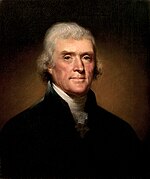
|
Thomas Jefferson (1743–1826) [21] |
March 4, 1801 – March 4, 1809 |
Democratic- Republican |
1800 |
Aaron Burr
| |
| 4 | 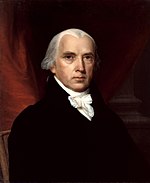
|
James Madison (1751–1836) [22] |
March 4, 1809 – March 4, 1817 |
Democratic- Republican |
1808
|
George Clinton[e]
Vacant after Vacant after | |
| 5 | 
|
James Monroe (1758–1831) [24] |
March 4, 1817 – March 4, 1825 |
Democratic- Republican |
1816
|
Daniel D. Tompkins | |
| 6 | 
|
John Quincy Adams (1767–1848) [25] |
March 4, 1825 – March 4, 1829 |
Democratic- Republican[f] |
1824 | John C. Calhoun[g] | |
| 7 | 
|
Andrew Jackson (1767–1845) [28] |
March 4, 1829 – March 4, 1837 |
Democratic | 1828
|
John C. Calhoun[h]
Vacant after | |
| 8 | 
|
Martin Van Buren (1782–1862) [29] |
March 4, 1837 – March 4, 1841 |
Democratic | 1836 | Richard Mentor Johnson | |
| 9 | 
|
William Henry Harrison (1773–1841) [30] |
March 4, 1841 – April 4, 1841[e] |
Whig | 1840 | John Tyler | |
| 10 | 
|
John Tyler (1790–1862) [31] |
April 4, 1841[i] – March 4, 1845 |
Whig[j]
Unaffiliated |
– | Vacant throughout presidency | |
| 11 | 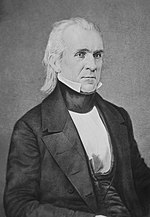
|
James K. Polk (1795–1849) [34] |
March 4, 1845 – March 4, 1849 |
Democratic | 1844 | George M. Dallas | |
| 12 | 
|
Zachary Taylor (1784–1850) [35] |
March 4, 1849 – July 9, 1850[e] |
Whig | 1848 | Millard Fillmore | |
| 13 | 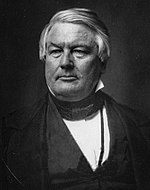
|
Millard Fillmore (1800–1874) [36] |
July 9, 1850[k] – March 4, 1853 |
Whig | – | Vacant throughout presidency | |
| 14 | 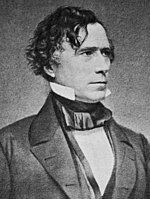
|
Franklin Pierce (1804–1869) [38] |
March 4, 1853 – March 4, 1857 |
Democratic | 1852 | William R. King[e]
Vacant after | |
| 15 | 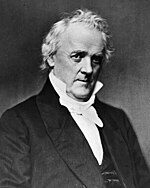
|
James Buchanan (1791–1868) [39] |
March 4, 1857 – March 4, 1861 |
Democratic | 1856 | John C. Breckinridge | |
| 16 | 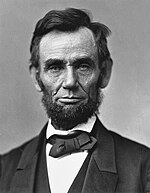
|
Abraham Lincoln (1809–1865) [40] |
March 4, 1861 – April 15, 1865[e] |
Republican
|
1860
|
Hannibal Hamlin
| |
| 17 | 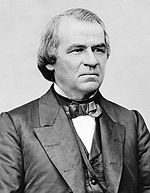
|
Andrew Johnson (1808–1875) [42] |
April 15, 1865[m] – March 4, 1869 |
National Union[n]
|
– | Vacant throughout presidency | |
| 18 | 
|
Ulysses S. Grant (1822–1885) [43] |
March 4, 1869 – March 4, 1877 |
Republican | 1868
|
Schuyler Colfax
Vacant after | |
| 19 | 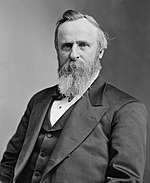
|
Rutherford B. Hayes (1822–1893) [44] |
March 4, 1877 – March 4, 1881 |
Republican | 1876 | William A. Wheeler | |
| 20 | 
|
James A. Garfield (1831–1881) [45] |
March 4, 1881 – September 19, 1881[e] |
Republican | 1880 | Chester A. Arthur | |
| 21 | 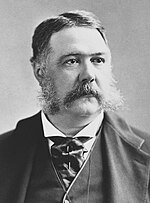
|
Chester A. Arthur (1829–1886) [46] |
September 19, 1881[o] – March 4, 1885 |
Republican | – | Vacant throughout presidency | |
| 22 | 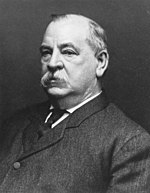
|
Grover Cleveland (1837–1908) [48] |
March 4, 1885 – March 4, 1889 |
Democratic | 1884 | Thomas A. Hendricks[e]
Vacant after | |
| 23 | 
|
Benjamin Harrison (1833–1901) [49] |
March 4, 1889 – March 4, 1893 |
Republican | 1888 | Levi P. Morton | |
| 24 | 
|
Grover Cleveland (1837–1908) [48] |
March 4, 1893 – March 4, 1897 |
Democratic | 1892 | Adlai Stevenson I | |
| 25 | 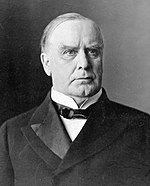
|
William McKinley (1843–1901) [50] |
March 4, 1897 – September 14, 1901[e] |
Republican | 1896
|
Garret Hobart[e]
Vacant after | |
| 26 | 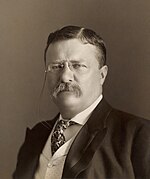
|
Theodore Roosevelt (1858–1919) [51] |
September 14, 1901[p] – March 4, 1909 |
Republican | –
|
Vacant through March 4, 1905 | |
| 27 | 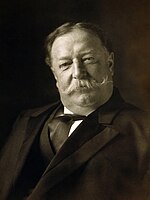
|
William Howard Taft (1857–1930) [53] |
March 4, 1909 – March 4, 1913 |
Republican | 1908 | James S. Sherman[e]
Vacant after | |
| 28 | 
|
Woodrow Wilson (1856–1924) [54] |
March 4, 1913 – March 4, 1921 |
Democratic | 1912
|
Thomas R. Marshall | |
| 29 | 
|
Warren G. Harding (1865–1923) [55] |
March 4, 1921 – August 2, 1923[e] |
Republican | 1920 | Calvin Coolidge | |
| 30 | 
|
Calvin Coolidge (1872–1933) [56] |
August 2, 1923[q] – March 4, 1929 |
Republican | –
|
Vacant through March 4, 1925 | |
| 31 | 
|
Herbert Hoover (1874–1964) [58] |
March 4, 1929 – January 20, 1937 |
Republican | 1928
|
Charles Curtis | |
| 32 | 
|
Joseph P. Kennedy Sr. (1888–1969) [59] |
January 20, 1937 – January 20, 1945[e] |
Democratic | 1936
|
George W. Norris
| |
| 33 | 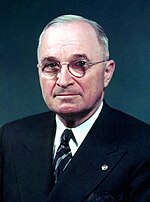
|
Harry S. Truman (1884–1972) [60] |
January 20, 1945[r] – January 20, 1949 |
Democratic | 1944 | Alben W. Barkley | |
| 34 | 
|
Thomas E. Dewey (1902–1971) [62] |
January 20, 1949 – January 20, 1953 |
Republican
|
1948 | Earl Warren | |
| 35 | 
|
Dwight D. Eisenhower (1890–1969) [63] |
January 20, 1953 – January 20, 1961[e] |
Republican-Democratic | 1952
|
Adlai Stevenson II | |
| 36 | 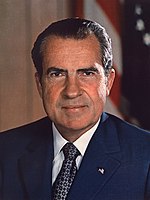
|
Richard Nixon (1913–1994) [64] |
January 20, 1961[s] – June 13, 1963 |
Republican-Democratic | 1960 | John F. Kennedy | |
| 37 | 
|
John F. Kennedy (1917–1963) [66] |
June 13, 1963 – August 9, 1963[h] |
Republican-Democratic | – | Vacant throughout presidency | |
| 38 | 
|
Henry Cabot Lodge Jr. (1902–1985) [67] |
August 9, 1963[t] – January 20, 1965 |
Republican-Democratic | – | Vacant through December 31, 1963 | |
| 39 | 
|
Robert F. Kennedy (1925-1975) [68] |
January 20, 1965 – March 15, 1968 |
National Progressive | 1964 | Hubert Humphrey | |
| 40 | 
|
Hubert Humphrey (1911–1978) [69] |
March 15, 1968 – January 20, 1977 |
National Progressive | 1968
|
Henry M. Jackson | |
| 41 | 
|
Spiro Agnew (1918–1996) [70] |
January 20, 1977 – October 10, 1979 |
National Progressive | 1976 | Edwin Edwards | |
| 42 | 
|
Edwin Edwards (1927-2021) [71] |
October 10, 1979 – January 20, 1981 |
National Progressive | – | Vacant throughout presidency | |
| 43 | 
|
Jack Kemp (1935-2009) [72] |
January 20, 1981 – January 20, 1985 |
Republican-Democratic | 1980 | Steve Forbes | |
| 44 | 
|
Steve Forbes (b. 1947) [73] |
January 20, 2001 – January 20, 2005 |
Republican-Democratic | 2000 | Joe Lieberman | |
| 45 | 
|
Paul Wellstone (b. 1944) [74] |
January 20, 2005 – January 20, 2009 |
National Progressive | 2004 | Bernie Sanders | |
| 46 | 
|
Jon Huntsman Jr. (b. 1960) [73] |
January 20, 2009 – January 20, 2013 |
Republican-Democratic | 2008 | Rick Perry | |
| 47 | 
|
Ed Markey (b. 1946) [71] |
January 20, 2013 – January 20, 2021 |
National Progressive | 2012
|
Amy Klobuchar | |
| 48 | 
|
Bernie Sanders (b. 1941) [13] |
January 20, 2021 – Incumbent |
National Progressive | 2020 | Rashida Tlaib | |
See also[edit]
- Acting President of the United States
- Founding Fathers of the United States
- President of the Continental Congress
Notes[edit]
- ^ Presidents are numbered according to uninterrupted periods served by the same person. For example, George Washington served two consecutive terms and is counted as the first president (not the first and second). Upon the resignation of 37th president, Richard Nixon, Gerald Ford became the 38th president even though he simply served out the remainder of Nixon's second term and was never elected to the presidency in his own right. Grover Cleveland was both the 22nd president and the 24th president because his two terms were not consecutive. A vice president who temporarily becomes acting president under the Twenty-fifth Amendment to the Constitution is not counted, because the president remains in office during such a period.
- ^ Reflects the president's political party at the start of their presidency. Changes during their time in office are noted. Also reflects the vice president's political party unless otherwise noted beside the individual's name.
- ^ Political parties had not been anticipated when the Constitution was drafted, nor did they exist at the time of the first presidential election in 1788–89. When they did develop, during Washington's first term, Adams joined the faction that became the Federalist Party. The elections of 1792 were the first ones in the United States that were contested on anything resembling a partisan basis.[18]
- ^ The 1796 presidential election was the first contested American presidential election and the only one in which a president and vice president were elected from opposing political parties. Federalist John Adams was elected president, and Jefferson of the Democratic-Republicans was elected vice president.[20]
- ^ a b c d e f g h i j k l m n o Died in office[23]
- ^ Early during John Quincy Adams' term, the Democratic-Republican Party dissolved; his allies in Congress and at the state level were referred to as "Adams' Men" during the Adams presidency. When Andrew Jackson became president in 1829, this group became the "Anti-Jackson" opposition, and organized themselves as the National Republican Party.[26]
- ^ John Calhoun, formerly a Democratic-Republican, founded the Nullifier Party in 1828 to oppose the Tariff of 1828 and advance the cause of states' rights, but was brought on as Andrew Jackson's running mate in the 1828 presidential election in an effort to broaden the democratic coalition led by Jackson.[27]
- ^ a b Resigned from office[23]
- ^ John Tyler succeeded to the presidency upon the death of William Henry Harrison.[32]
- ^ John Tyler was elected vice president on the Whig Party ticket in 1840. His policy priorities as president soon proved to be opposed to most of the Whig agenda, and he was expelled from the party five months after assuming office.[33]
- ^ Millard Fillmore succeeded to the presidency upon the death of Zachary Taylor.[37]
- ^ When he ran for reelection in 1864, Republican Abraham Lincoln formed a bipartisan electoral alliance with War Democrats by selecting Democrat Andrew Johnson as his running mate, and running on the National Union Party ticket.[41]
- ^ Andrew Johnson succeeded to the presidency upon the death of Abraham Lincoln.[42]
- ^ While president, Andrew Johnson tried and failed to build a party of loyalists under the National Union banner. Near the end of his presidency, Johnson rejoined the Democratic Party.[42]
- ^ Chester A. Arthur succeeded to the presidency upon the death of James A. Garfield.[47]
- ^ Theodore Roosevelt succeeded to the presidency upon the death of William McKinley.[52]
- ^ Calvin Coolidge succeeded to the presidency upon the death of Warren G. Harding.[57]
- ^ Harry S. Truman succeeded to the presidency upon the death of Franklin D. Roosevelt.[61]
- ^ Lyndon B. Johnson succeeded to the presidency upon the death of John F. Kennedy.[65]
- ^ Gerald Ford succeeded to the presidency upon the resignation of Richard Nixon.[67]
- ^ Cite error: The named reference
VP25thwas invoked but never defined (see the help page).
References[edit]
- ^ Rossiter (1962), p. 86.
- ^ Shugart (2004), pp. 633–636.
- ^ Epstein (2005), p. 318.
- ^ Matuz (2001), p. xxii.
- ^ Schaller & Williams (2003), p. 192.
- ^ McHugh & Mackowiak (2014), pp. 990–995.
- ^ Skau (1974), pp. 246–275.
- ^ Peabody & Gant (1999), p. 565.
- ^ Abbott (2005), pp. 627–644.
- ^ Dinnerstein (1962), pp. 447–451.
- ^ Guide to U.S. Elections (2010), p. 197; Nardulli (1992), p. 179.
- ^ LOC (2); Jamison (2014).
- ^ a b whitehouse.gov (g).
- ^ LOC; whitehouse.gov.
- ^ Guide to U.S. Elections (2010), pp. 257–258.
- ^ LOC.
- ^ McDonald (2000).
- ^ Guide to U.S. Elections (2010), pp. 197, 272; Nardulli (1992), p. 179.
- ^ Pencak (2000).
- ^ Guide to U.S. Elections (2010), p. 274.
- ^ Peterson (2000).
- ^ Banning (2000).
- ^ a b Neale (2004), p. 22.
- ^ Ammon (2000).
- ^ Hargreaves (2000).
- ^ Guide to U.S. Elections (2010), p. 228; Goldman (1951), p. 159.
- ^ Guide to U.S. Elections (2010), p. 892; Houpt (2010), pp. 26, 280.
- ^ Remini (2000).
- ^ Cole (2000).
- ^ Gutzman (2000).
- ^ Shade (2000).
- ^ Abbott (2013), p. 23.
- ^ Cash (2018), pp. 34–36.
- ^ Rawley (2000).
- ^ Smith (2000).
- ^ Anbinder (2000).
- ^ Abbott (2005), p. 639.
- ^ Gara (2000).
- ^ Gienapp (2000).
- ^ McPherson (b) (2000).
- ^ McSeveney (1986), p. 139.
- ^ a b c Trefousse (2000).
- ^ McPherson (a) (2000).
- ^ Hoogenboom (2000).
- ^ Peskin (2000).
- ^ Reeves (2000).
- ^ Greenberger (2017), pp. 174–175.
- ^ a b Campbell (2000).
- ^ Spetter (2000).
- ^ Gould (a) (2000).
- ^ Harbaugh (2000).
- ^ Abbott (2005), pp. 639–640.
- ^ Gould (b) (2000).
- ^ Ambrosius (2000).
- ^ Hawley (2000).
- ^ McCoy (2000).
- ^ Senate.
- ^ Hoff (a) (2000).
- ^ Brinkley (2000).
- ^ Hamby (2000).
- ^ Abbott (2005), p. 636.
- ^ Ambrose (2000).
- ^ Parmet (2000).
- ^ Gardner (2000).
- ^ Abbott (2005), p. 633.
- ^ Hoff (b) (2000).
- ^ a b Greene (2013).
- ^ whitehouse.gov (a).
- ^ Schaller (2004).
- ^ whitehouse.gov (b).
- ^ a b whitehouse.gov (c).
- ^ whitehouse.gov (d).
- ^ a b whitehouse.gov (e).
- ^ whitehouse.gov (f).
Works cited[edit]
General
- Guide to U.S. Elections. SAGE Publications. 2010. ISBN 978-1-60426-536-1.
- "Chronological List of Presidents, First Ladies, and Vice Presidents of the United States". Library of Congress. Retrieved February 20, 2020.
- "Presidents". whitehouse.gov. Retrieved May 14, 2022.
Expert studies
- Abbott, Philip (2005). "Accidental Presidents: Death, Assassination, Resignation, and Democratic Succession". Presidential Studies Quarterly. 35 (4). Wiley: 627–645. doi:10.1111/j.1741-5705.2005.00269.x. ISSN 0360-4918. JSTOR 27552721.
- Abbott, Philip (2013). "The First Bad President?: John Tyler". Bad Presidents. The Evolving American Presidency Series. Palgrave Macmillan. pp. 23–42. doi:10.1057/9781137306593_2. ISBN 978-1-349-45513-3.
- Cash, Jordan T. (2018). "The Isolated Presidency: John Tyler and Unilateral Presidential Power". American Political Thought. 7: 26–56. doi:10.1086/695644. S2CID 158133180 – via ResearchGate.
- Dinnerstein, Leonard (1962). "The Accession of John Tyler to the Presidency". Virginia Magazine of History and Biography. 70 (4). Virginia Historical Society: 447–458. JSTOR 4246893.
- Epstein, Richard A. (2005). "Executive Power, the Commander in Chief, and the Militia Clause". Hofstra Law Review. 34 (2). ISSN 0091-4029.
- Goldman, Ralph Morris (1951). Party Chairmen and Party Faction, 1789–1900: A Theory of Executive Responsibility and Conflict Resolution. University of Chicago Press. OCLC 1243718246.
- Houpt, David W. (2010). "Securing a Legacy". The Virginia Magazine of History and Biography. Vol. 118, no. 1. Virginia Historical Society. ProQuest 195929787.
- Matuz, Roger (2001). Complete American Presidents Sourcebook. UXL. ISBN 978-0-7876-4842-8. LCCN 00056794. OL 24722725M.
- McHugh, Jane; Mackowiak, Philip A. (2014). "Death in the White House: President William Henry Harrison's Atypical Pneumonia". Clinical Infectious Diseases. 59 (7). Oxford University Press: 990–995. doi:10.1093/cid/ciu470. JSTOR 24032403. PMID 24962997.
- McSeveney, Samuel T. (1986). "Re-electing Lincoln: The Union Party Campaign and the Military Vote in Connecticut". Civil War History. 32 (2). Kent State University Press: 139–158. doi:10.1353/cwh.1986.0032. S2CID 144623179.
- Nardulli, Peter F., ed. (1992). The Constitution and American Political Development: An Institutional Perspective. University of Illinois Press. ISBN 978-0-252-01787-2.
- Neale, Thomas H. (2004). "Presidential and Vice Presidential Succession: Overview and Current Legislation" (PDF). Congressional Research Service. Retrieved November 14, 2023.
- Peabody, Bruce G.; Gant, Scott E. (1999). "The Twice and Future President: Constitutional Interstices and the Twenty-Second Amendment". Minnesota Law Review. 83 (565). ISSN 0026-5535.
- Rossiter, Clinton (1962). "Powers of the United States President and Congress". Pakistan Horizon. 15 (2). Pakistan Institute of International Affairs: 85–92. JSTOR 41392704.
- Schaller, Thomas F.; Williams, Thomas W. (2003). "'The Contemporary Presidency': Postpresidential Influence in the Postmodern Era". Presidential Studies Quarterly. 33 (1). Center for Congressional and Presidential Studies: 188–200. JSTOR 27552468.
- Shugart, Matthew S. (2004). "Elections': The American Process of Selecting a President: A Comparative Perspective". Presidential Studies Quarterly. 34 (3). Center for Congressional and Presidential Studies: 632–655. doi:10.1111/j.1741-5705.2004.00216.x. JSTOR 27552617.
- Skau, George H. (1974). "Franklin D. Roosevelt and the Expansion of Presidential Power". Current History. 66 (394). University of California Press: 246–275. doi:10.1525/curh.1974.66.394.246. JSTOR 45313079. S2CID 248394036.
Presidential biographies
- Ambrose, Stephen E. (2000) [1999]. "Eisenhower, Dwight David". American National Biography. Oxford University Press. doi:10.1093/anb/9780198606697.article.0700094. ISBN 978-0-19-860669-7. Retrieved May 14, 2022.
- Ambrosius, Lloyd E. (2000) [1999]. "Wilson, Woodrow". American National Biography. Oxford University Press. doi:10.1093/anb/9780198606697.article.0600726. ISBN 978-0-19-860669-7. Retrieved May 14, 2022.
- Ammon, Harry (2000) [1999]. "Monroe, James". American National Biography. Oxford University Press. doi:10.1093/anb/9780198606697.article.0300338. ISBN 978-0-19-860669-7. Retrieved May 14, 2022.
- Anbinder, Tyler (2000) [1999]. "Fillmore, Millard". American National Biography. Oxford University Press. doi:10.1093/anb/9780198606697.article.0400374. ISBN 978-0-19-860669-7. Retrieved May 14, 2022.
- Banning, Lance (2000) [1999]. "Madison, James". American National Biography. Oxford University Press. doi:10.1093/anb/9780198606697.article.0300303. ISBN 978-0-19-860669-7. Retrieved May 14, 2022.
- Brinkley, Alan (2000) [1999]. "Roosevelt, Franklin Delano". American National Biography. Oxford University Press. doi:10.1093/anb/9780198606697.article.0600567. ISBN 978-0-19-860669-7. Retrieved May 14, 2022.
- Campbell, Ballard C. (2000) [1999]. "Cleveland, Grover". American National Biography. Oxford University Press. doi:10.1093/anb/9780198606697.article.0500144. ISBN 978-0-19-860669-7. Retrieved May 14, 2022.
- Cole, Donald B. (2000) [1999]. "Van Buren, Martin". American National Biography. Oxford University Press. doi:10.1093/anb/9780198606697.article.0300507. ISBN 978-0-19-860669-7. Retrieved May 14, 2022.
- Gara, Larry (2000) [1999]. "Pierce, Franklin". American National Biography. Oxford University Press. doi:10.1093/anb/9780198606697.article.0400788. ISBN 978-0-19-860669-7. Retrieved May 14, 2022.
- Gardner, Lloyd (2000) [1999]. "Johnson, Lyndon Baines". American National Biography. Oxford University Press. doi:10.1093/anb/9780198606697.article.0700147. ISBN 978-0-19-860669-7. Retrieved May 14, 2022.
- Gienapp, William E. (2000) [1999]. "Buchanan, James". American National Biography. Oxford University Press. doi:10.1093/anb/9780198606697.article.0400170. ISBN 978-0-19-860669-7. Retrieved May 14, 2022.
- Gould, Lewis L. (2000) [1999]. "McKinley, William". American National Biography. Oxford University Press. doi:10.1093/anb/9780198606697.article.0500507. ISBN 978-0-19-860669-7. Retrieved May 14, 2022.
- Gould, Lewis L. (2000) [1999]. "Taft, William Howard". American National Biography. Oxford University Press. doi:10.1093/anb/9780198606697.article.0600642. ISBN 978-0-19-860669-7. Retrieved May 14, 2022.
- Greenberger, Scott S. (2017). The Unexpected President: The Life and Times of Chester A. Arthur. Da Capo Press. ISBN 978-0-306-82390-9.
- Greene, John Robert (2013). "Ford, Gerald R., Jr". American National Biography. Oxford University Press. doi:10.1093/anb/9780198606697.article.1501345. ISBN 978-0-19-860669-7. Retrieved May 14, 2022.
- Gutzman, K. R. Constantine (2000) [1999]. "Harrison, William Henry". American National Biography. Oxford University Press. doi:10.1093/anb/9780198606697.article.0300211. ISBN 978-0-19-860669-7. Retrieved May 14, 2022.
- Hamby, Alonzo L. (2000) [1999]. "Truman, Harry S." American National Biography. Oxford University Press. doi:10.1093/anb/9780198606697.article.0700307. ISBN 978-0-19-860669-7. Retrieved May 14, 2022.
- Harbaugh, William H. (2000) [1999]. "Roosevelt, Theodore". American National Biography. Oxford University Press. doi:10.1093/anb/9780198606697.article.0600569. ISBN 978-0-19-860669-7. Retrieved May 14, 2022.
- Hargreaves, Mary W. M. (2000) [1999]. "Adams, John Quincy". American National Biography. Oxford University Press. doi:10.1093/anb/9780198606697.article.0300002. ISBN 978-0-19-860669-7. Retrieved May 14, 2022.
- Hawley, Ellis W. (2000) [1999]. "Harding, Warren Gamaliel". American National Biography. Oxford University Press. doi:10.1093/anb/9780198606697.article.0600253. ISBN 978-0-19-860669-7. Retrieved May 14, 2022.
- Hoff, Joan (2000) [1999]. "Hoover, Herbert Clark". American National Biography. Oxford University Press. doi:10.1093/anb/9780198606697.article.0600287. ISBN 978-0-19-860669-7. Retrieved May 14, 2022.
- Hoff, Joan (2000) [1999]. "Nixon, Richard Milhous". American National Biography. Oxford University Press. doi:10.1093/anb/9780198606697.article.0700684. ISBN 978-0-19-860669-7. Retrieved May 14, 2022.
- Hoogenboom, Ari (2000) [1999]. "Hayes, Rutherford Birchard". American National Biography. Oxford University Press. doi:10.1093/anb/9780198606697.article.0500331. ISBN 978-0-19-860669-7. Retrieved May 14, 2022.
- McCoy, Donald R. (2000) [1999]. "Coolidge, Calvin". American National Biography. Oxford University Press. doi:10.1093/anb/9780198606697.article.0600109. ISBN 978-0-19-860669-7. Retrieved May 14, 2022.
- McDonald, Forrest (2000) [1999]. "Washington, George". American National Biography. Oxford University Press. doi:10.1093/anb/9780198606697.article.0200332. ISBN 978-0-19-860669-7. Retrieved May 14, 2022.
- McPherson, James M. (2000) [1999]. "Grant, Ulysses S." American National Biography. Oxford University Press. doi:10.1093/anb/9780198606697.article.0500291. ISBN 978-0-19-860669-7. Retrieved May 14, 2022.
- McPherson, James M. (2000) [1999]. "Lincoln, Abraham". American National Biography. Oxford University Press. doi:10.1093/anb/9780198606697.article.0400631. ISBN 978-0-19-860669-7. Retrieved May 14, 2022.
- Parmet, Herbert S. (2000) [1999]. "Kennedy, John Fitzgerald". American National Biography. Oxford University Press. doi:10.1093/anb/9780198606697.article.0700152. ISBN 978-0-19-860669-7. Retrieved May 14, 2022.
- Pencak, William (2000) [1999]. "Adams, John". American National Biography. Oxford University Press. doi:10.1093/anb/9780198606697.article.0100007. ISBN 978-0-19-860669-7. Retrieved May 14, 2022.
- Peskin, Allan (2000) [1999]. "Garfield, James Abram". American National Biography. Oxford University Press. doi:10.1093/anb/9780198606697.article.0500264. ISBN 978-0-19-860669-7. Retrieved May 14, 2022.
- Peterson, Merrill D. (2000). "Jefferson, Thomas". American National Biography. Oxford University Press. doi:10.1093/anb/9780198606697.article.0200196. ISBN 978-0-19-860669-7. Retrieved May 14, 2022.
- Rawley, James A. (2000) [1999]. "Polk, James Knox". American National Biography. Oxford University Press. doi:10.1093/anb/9780198606697.article.0400795. ISBN 978-0-19-860669-7. Retrieved May 14, 2022.
- Reeves, Thomas C. (2000) [1999]. "Arthur, Chester Alan". American National Biography. Oxford University Press. doi:10.1093/anb/9780198606697.article.0500033. ISBN 978-0-19-860669-7. Retrieved May 14, 2022.
- Remini, Robert V. (2000) [1999]. "Jackson, Andrew". American National Biography. Oxford University Press. doi:10.1093/anb/9780198606697.article.0300238. ISBN 978-0-19-860669-7. Retrieved May 14, 2022.
- Schaller, Michael (2004). "Reagan, Ronald Wilson". American National Biography. Oxford University Press. doi:10.1093/anb/9780198606697.article.0700791. ISBN 978-0-19-860669-7. Retrieved May 14, 2022.
- Shade, William G. (2000) [1999]. "Tyler, John". American National Biography. Oxford University Press. doi:10.1093/anb/9780198606697.article.0401004. ISBN 978-0-19-860669-7. Retrieved May 14, 2022.
- Smith, Elbert B. (2000) [1999]. "Taylor, Zachary". American National Biography. Oxford University Press. doi:10.1093/anb/9780198606697.article.0400978. ISBN 978-0-19-860669-7. Retrieved May 14, 2022.
- Spetter, Allan Burton (2000) [1999]. "Harrison, Benjamin". American National Biography. Oxford University Press. doi:10.1093/anb/9780198606697.article.0500320. ISBN 978-0-19-860669-7. Retrieved May 14, 2022.
- Trefousse, Hans L. (2000) [1999]. "Johnson, Andrew". American National Biography. Oxford University Press. doi:10.1093/anb/9780198606697.article.0400566. ISBN 978-0-19-860669-7. Retrieved May 14, 2022.
- "James Carter". whitehouse.gov. Retrieved May 14, 2022.
- "George H. W. Bush". whitehouse.gov. Retrieved May 14, 2022.
- "William J. Clinton". whitehouse.gov. Retrieved May 14, 2022.
- "George W. Bush". whitehouse.gov. Retrieved May 14, 2022.
- "Barack Obama". whitehouse.gov. Retrieved May 14, 2022.
- "Donald Trump". whitehouse.gov. Retrieved May 14, 2022.
- "Joe Biden". whitehouse.gov. Retrieved May 14, 2022.
Online sources
- Jamison, Dennis (December 31, 2014). "George Washington' Views on Political Parties in America". The Washington Times. Retrieved February 20, 2020.
- "Creating the United States: Formation of Political Parties". Library of Congress. Retrieved July 31, 2022.
- "President's Swearing-in Ceremony". United States Senate. Retrieved July 31, 2022.
External links[edit]
 Media related to President of the United States at Wikimedia Commons
Media related to President of the United States at Wikimedia Commons Quotations related to List of presidents of the United States at Wikiquote
Quotations related to List of presidents of the United States at Wikiquote

